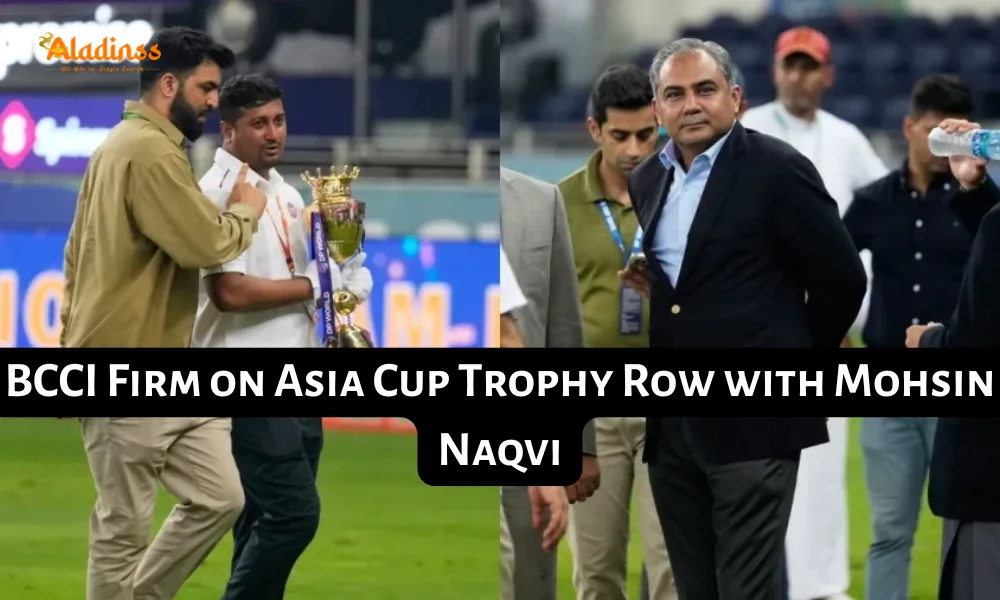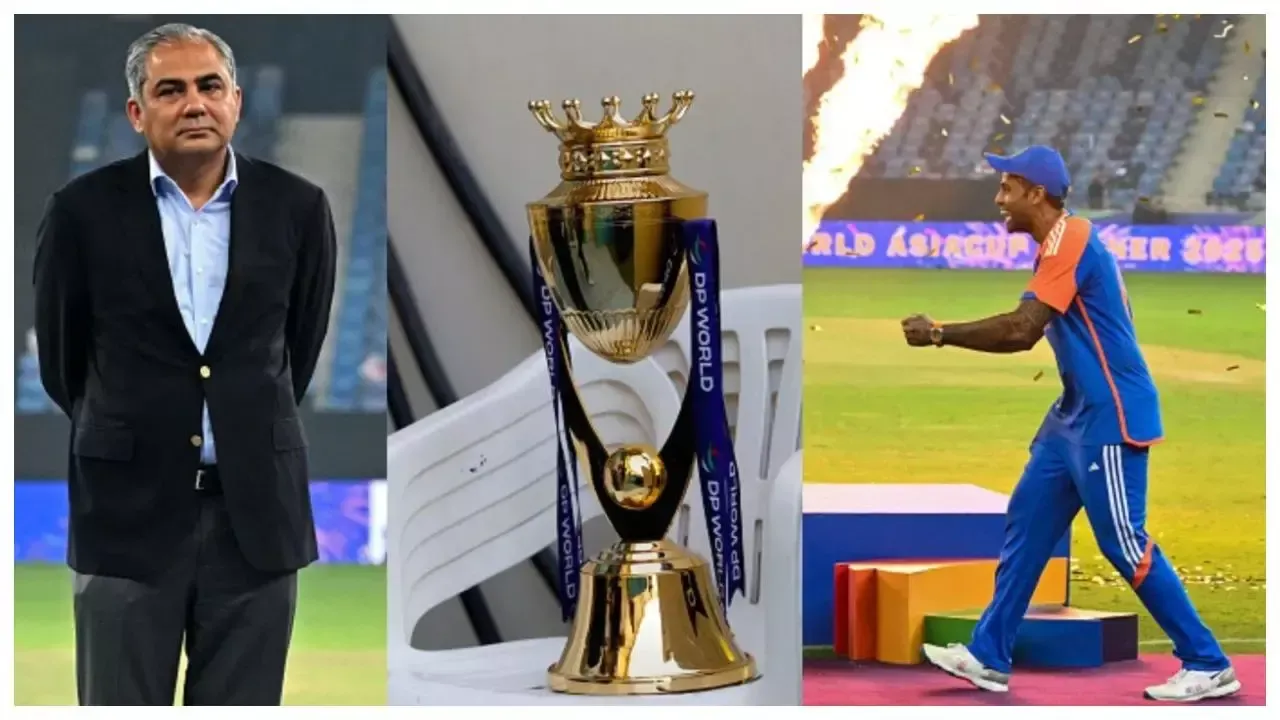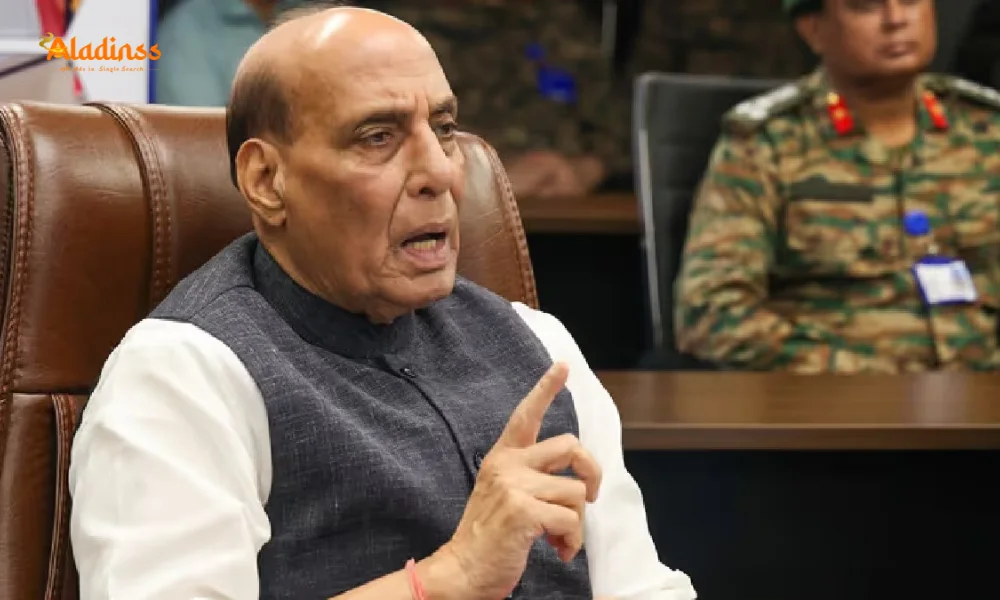BCCI Firm on Asia Cup Trophy Row with Mohsin Naqvi

BCCI Stands Firm on Asia Cup Trophy Row with Mohsin Naqvi
The Board of Control for Cricket in India (BCCI) is gearing up to confront the ongoing Asia Cup trophy controversy at the International Cricket Council (ICC) meeting in Dubai, starting November 4, 2025. BCCI Secretary Devajit Saikia affirmed that India will not budge on its refusal to accept the trophy from Mohsin Naqvi, Pakistan's Interior Minister and Asian Cricket Council (ACC) Chairman. This firm stance follows a formal letter sent to the ACC ten days prior, which received no satisfactory reply, escalating tensions in the wake of India's dominant five-wicket victory.
During the post-match ceremony, the awkward moment unfolded when an official whisked away the Asia Cup trophy from the podium after India's rejection, leaving the presentation in disarray. Saikia emphasized to ANI that the trophy rightfully belongs to India, won convincingly, and will be handed over appropriately-minus Naqvi's involvement. This Asia Cup trophy row highlights deeper geopolitical frictions influencing cricket diplomacy between India and Pakistan.
Captain Suryakumar Yadav lightened the mood by reenacting Rohit Sharma's iconic slow-motion trophy lift from the 2024 T20 World Cup final, using an imaginary cup to rally his teammates. Yet, beneath the celebrations lies a resolute BCCI position against accepting honors from figures tied to political sensitivities.

BCCI's Unwavering Stance and ICC Agenda
Saikia's statements underscore the BCCI's commitment: "The trophy will come, and that is for certain because it has been won by India hands down. Only the timeline needs to be fixed." He reiterated that had acceptance from Naqvi been an option, it would have occurred on final day itself. The board's letter to ACC, dispatched amid the victory glow, sought resolution but met silence, prompting escalation to the ICC board meeting.
This Asia Cup trophy row isn't isolated; it echoes longstanding strains in Indo-Pak cricket relations, where bilateral series have been suspended since 2008 due to security concerns. Naqvi's dual role as ACC head and Pakistan's Interior Minister-overseeing law enforcement-amplifies sensitivities, especially post-India's triumphs that symbolize national pride.
The ICC gathering in Dubai, attended by global cricket administrators, provides a neutral forum. BCCI anticipates discussing not just the trophy handover but broader protocols for ceremonial protocols in multi-nation events involving politically charged figures.
The Chaotic Post-Match Presentation Unraveled
The final's aftermath turned surreal when India's skipper declined the trophy, leading to its abrupt removal by an unnamed official. Spectators and broadcasters were left puzzled as the platform cleared hastily, shifting focus to individual awards. This incident in the Asia Cup trophy controversy has sparked debates on sportsmanship versus national sovereignty.
India's win, a testament to strategic depth with Yadav's unbeaten knock, was overshadowed momentarily. Yet, the team's resilience shone through Yadav's playful gesture, invoking Sharma's 2024 heroics that ended a 17-year ICC drought. Such moments humanize the high-stakes world of international cricket.
Behind the scenes, BCCI officials coordinated discreetly, ensuring the narrative stayed on victory while diplomatically navigating the impasse. This blend of firmness and finesse defines India's approach in global cricket governance.
Geopolitical Shadows Over Cricket Diplomacy
The Mohsin Naqvi row stems from intertwined politics and sport. As Pakistan's Interior Minister since 2024, Naqvi's oversight of inter-provincial coordination includes sensitive border issues with India. BCCI views his ACC chairmanship-elected in 2024-as politicizing a regional body meant for fostering cricket unity.
Historical precedents abound: the 2019 ICC intervention in Pakistan's hosting bids, or India's boycott of 2023 Asia Cup games in Pakistan, opting for hybrids in Sri Lanka. These underscore cricket as a soft power tool, where trophies symbolize more than silverware-they embody unresolved bilateral dialogues.
ACC's non-response to BCCI's missive signals internal divisions, with nations like Sri Lanka and Bangladesh caught in the crossfire. India's financial clout-contributing 40% to ICC revenues-bolsters its leverage, potentially reshaping ACC leadership norms.
India's Triumphant Path to Asia Cup Glory
Despite the off-field drama, on-field dominance defined the tournament. India, under Yadav's interim captaincy, navigated a grueling schedule, clinching key wins against Bangladesh and Afghanistan. The final thriller saw Pakistan set 180, only for India's middle order to script a chase under lights.
- Standout performers: Virat Kohli's 80-run knock, Jasprit Bumrah's 3/22.
- Tournament stats: India unbeaten in 5 matches, highest run-rate at 8.5.
- Legacy moment: First Asia Cup title since 2018, solidifying T20 supremacy.
This victory propels India toward the 2026 Champions Trophy, with momentum from 2024's T20 glory. The trophy, once a point of contention, now awaits a dignified reception, affirming cricket's unifying ethos.
ICC Meeting: Expectations and Potential Outcomes
Dubai's ICC conclave, from November 4-7, will dissect not only the Asia Cup trophy row but governance reforms. BCCI pushes for apolitical appointments in affiliates, citing Naqvi's case as emblematic. Allies like England and Australia may back, given shared democratic values.
Possible resolutions include a neutral handover by ICC President Jay Shah, or ACC restructuring. Saikia hinted at timeline flexibility, prioritizing symbolism over immediacy. This could set precedents for future events, like the 2025 Women's Asia Cup.
Stakeholders anticipate heated debates, but consensus-building remains key to cricket's global health. India's voice, amplified by recent successes, could steer toward equitable protocols.
Broader Implications for Indo-Pak Cricket Ties
The Mohsin Naqvi controversy revives scrutiny on hybrid models, where neutral venues host high-voltage clashes. Fans crave bilateral series, but security trumps nostalgia, with last full tour in 2007. Initiatives like the 2023 Asia Cup hybrid mitigated boycotts, yet trophy rows expose fractures.
Economically, India-Pak matches generate billions in viewership, per 2024 stats showing 500 million global eyes. Resolving such impasses fosters revenue-sharing, benefiting emerging boards. For players, it ensures unmarred legacies, free from off-field shadows.
Optimists see this as a diplomatic pivot, where cricket bridges divides, echoing 2004's landmark series amid peace talks.
Fan Reactions and Social Media Buzz
Social platforms erupted post-final, with #AsiaCupTrophy trending worldwide. Yadav's mimicry garnered 2 million likes, blending humor with defiance. Supporters praised BCCI's resolve, viewing it as safeguarding national dignity.
Critics, however, lamented politicization, urging focus on sport. Memes juxtaposing the empty podium with 1983's triumph went viral, capturing irony. This digital discourse amplifies the Asia Cup trophy controversy's reach, engaging Gen Z fans.
Influencers like Harsha Bhogle advocated dialogue, highlighting cricket's role in thawing relations.
Future of Regional Cricket Governance
Post-ICC, reforms could mandate conflict-of-interest disclosures for ACC roles. BCCI's advocacy might inspire similar in ECB or CA, promoting transparency. For Asia Cup, annual rotations could dilute dominance perceptions.
Youth programs, like U-19 exchanges, offer grassroots bridges, countering elite-level rifts. Ultimately, this row could catalyze a more inclusive ACC, where merit trumps mandates.
As India awaits its trophy, the episode reaffirms cricket's power: a game that unites, even in discord.
Comment / Reply From
No comments yet. Be the first to comment!










